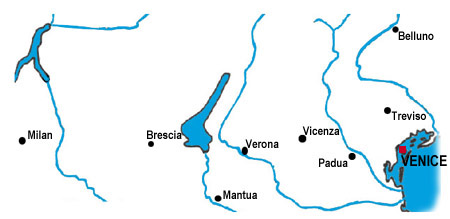Venice Acquires Treviso
For hundreds
of years Venice remained an island city-state without any territory
on the Italian mainland that adjoined her lagoon. The vast and powerful
empire that she had assembled all lay to the east: coastal cities
and fortresses throughout the eastern Mediterranean and along the
southern coast of the Black Sea and eastern coast of the Adriatic.
Though a new empire on the Italian mainland itself was perhaps inevitable,
events there began to unfold in a climate of danger and defense rather
than imperialistic fervor. In the early
years of the 1300s the Della Scala family, rulers of Verona, a city-state
lying about fifty miles west of the Venetian lagoon, had begun an
aggressive expansion of their territory. Vicenza, Feltre, Belluno
all fell before their forces. Nonetheless,
Venice was reluctant to undertake a military campaign on the mainland.
Finally, seeing no alternative, Venice launched a preemptive attack
into Paduan territory in October 1336. Her initial success soon brought
Milan, Mantua, Este and Florence into a military alliance with her.
By August of 1337 Padua had been captured, and a peace treaty with
the Della Scalas was signed in the following January.
The treaty ceded
Padua, Treviso and their territories to Venice. Cautious about how
much territory she could effectively control, and obligated to reward
the Carrara family of Padua for its assistance in the successful military
campaign, the Venetians placed Padua and the western portion of the
Trevisan territory under Carrara rule, subject to the nominal sovereignty
of Venice.
At last Venice
was a mainland empire as well as a maritime power. However, more fighting
lay ahead to retain the new territory, because the Carraras of Padua
were treacherous allies who soon tested
Venice's ability and resolve to remain on the mainland.
 They
captured Padua--just 25 miles from Venice--in September 1328 and in
July of the following year seized Treviso, whose territory reached
the shores of the Venetian lagoon itself. To the west and south the
Veronese captured Brescia, Parma and Lucca. The rising tide of the
Della Scala empire threatened the survival of Venice as an independent
state.
They
captured Padua--just 25 miles from Venice--in September 1328 and in
July of the following year seized Treviso, whose territory reached
the shores of the Venetian lagoon itself. To the west and south the
Veronese captured Brescia, Parma and Lucca. The rising tide of the
Della Scala empire threatened the survival of Venice as an independent
state.
Comments?
©
1998 C. I. Gable